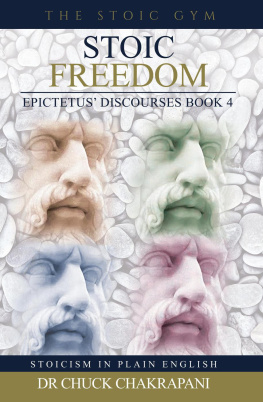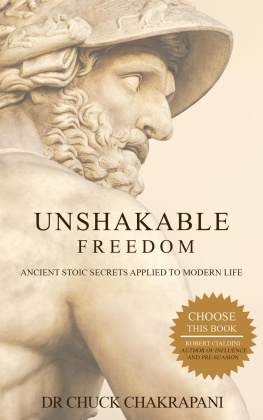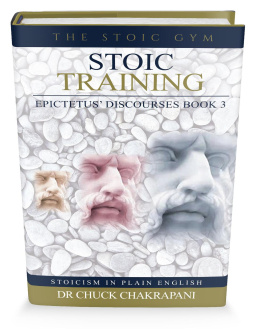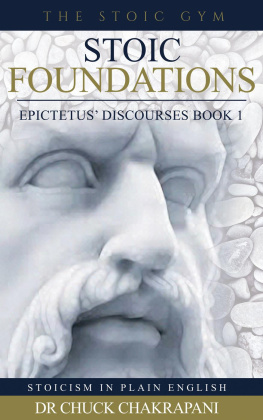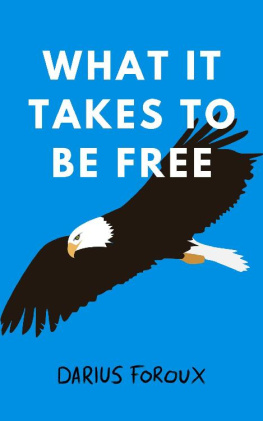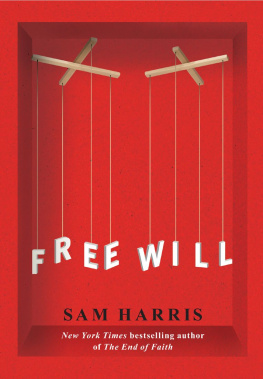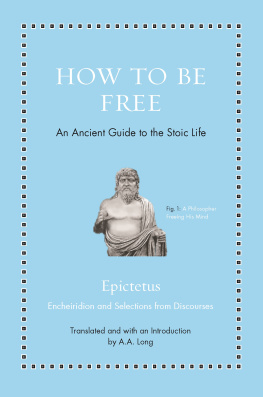Stoic Freedom
Epictetus Discoures Book 4
Stoicism in Plain English
Dr Chuck Chakrapani
The Stoic Gym Publications
Copyright 2018 by Chuck Chakrapani
All rights reserved. No part of this publication may be reproduced, distributed or transmitted in any form or by any means, including photocopying, recording, or other electronic or mechanical methods, without the prior written permission of the publisher, except in the case of brief quotations embodied in critical reviews and certain other non-commercial uses permitted by copyright law. For permission requests, write to the publisher, addressed Attention: Permissions Coordinator, at the address below.
Stoic Gym Publications
www.thestoicgym.com
Ordering Information:
Quantity sales. Special discounts are available on quantity purchases by corporations, associations, and others. For details, contact the Special Sales Department at the address above.
Stoic Foundations/Chuck Chakrapani. 1st ed.
ISBNs:
Print: 978-0-920219-36-2
ePub: 978-0-920219-37-9
Mobi: 978-0-920219-38-6
PDF: 978-0-920219-39-3
18 19 20 21 22 23 24 25 26 271 2 3 4 5 6 7 8 9 0
Contents
Basic Principles
T he Stoic goal is happiness . Not happiness in a narrow sense, but in a much more expansive sense. Stoic happiness or eudemonia is a way of thriving and flourishing. So, it is not just about being happy, but also about being tranquil, free, and fearless. The Stoic path to any one of these happiness, tranquillity, or freedom brings along with it the other aspects of flourishing as well.
Epictetus, perhaps because he spent the first two decades of his life as a slave, makes freedom his core focus. For Epictetus, freedom is synonymous with happiness. His discourses come back repeatedly to the theme of freedom. But what does it mean to be free? Epictetus explains:
You are free when you live as you wish; when you cannot be compelled, obstructed, or controlled; your choices cannot be blocked; when you get your desires fulfilled and when you dont face anything you want to avoid.
But is it possible to achieve this kind of freedom? What about the world we live in with so many constraints? Unscrupulous politicians, terrorists, violence, natural disasters, and insecurity surround us. Does it make sense even to think of the type of freedom that Epictetus talks about? Are his ideas outdated?
Epictetus might have lived 2,000 years ago, but the environment he lived in was far worse. He was born a slave and, until he was in his late teens, remained a slave. He lived under the rule of Nero. Roman emperors in those days were free to kill, imprison, or banish anyone and Nero was an extreme example of this. When Epictetus was set free, presumably after the death of Nero, he started to teach. Then he was banished by Emperor Domitian. Undeterred, he moved to the coastal city Nicopolis and continued to teach there. He was reputed to be lame as well. Yet Epictetus believed himself to be a free man. If the principles he taught made him free amid such adverse conditions, his advice is worth listening to.
Book IV of Epictetus Discourses starts with a lengthy discourse on freedom, presumably the longest of all his discourses. The rest of the book keeps returning to the theme of freedom. Here is the summary of the basic themes.
Basic principles: A quick outline
- Your desires imprison you. If you confine your desire only to what is under your control, then you will never be unfree. When we desire something that is not under our control, then anyone who has control over what we desire has power over us. When someone has power over us, we cannot be free. But if you dont desire anything that is not under your control, then you cannot be compelled, obstructed, or controlled; your choices cannot be blocked; you get your desires fulfilled and you dont face anything you want to avoid. External things themselves are not the problem, but our hanging on to them is. You can still enjoy things that the world has to offer, if you are willing to let them go them at a moments notice. When you align what you want to happen with what actually happens, you will be completely free. [1]
- Freedom has a price. If you want to be free, be prepared to pay. Your freedom is a valuable thing. If you want it, you should give up something that is of equal value to you now. You may have to choose between being restrained and dignified over pointlessly wasting time over frivolous things. Make your choice. But no matter what you choose, do it whole-heartedly. If you try to do two things at once, you will achieve neither. [2, 3]
- The more value you attach to external things, the less free you are to choose. Dont attach value to external things. Take them as they come. It is not what you do, but your judgments behind what you do that will decide whether you will be free or not. The more value you attach to any external thing even if it a desirable thing the less free you become. You become fearless when you stop valuing external things. [4, 7]
- A free person is not in conflict with anyone. Pay attention to what you truly care about. Then you wont be upset by what others think or say about you. When you dont value external things, other peoples opinion and their behaviour becomes irrelevant to you. So, you cannot be upset by them or be in conflict with them. [5, 6]
- A free person is patient. Free people are not carried away by external things, but take their time to judge things properly. They know that poor judgements are the cause of all evil and make sure they judge impressions correctly. They are patient and dont try to act before they are ready. [8]
- A free person is not envious. When someone has things that you dont have, dont assume they got them for free. They paid a price in terms of flattering others, and putting up with things that they really didnt want to do. You, on the other hand, have your freedom. There is no need to envy others. [9]
- A free person is not anxious. When you are anxious about the future, you want something that is not under your control. By being anxious about things you cannot control, you let go of things that are under your control. If you paid more attention to what is under your control and less attention to what is not, you would not be anxious. [10]
- A free person is pure. A free person keeps themselves clean both in body and in mind. While they are cultivating their inner qualities, they wont neglect their outer appearance. [11]
- A free person is steadfast. When you let your mind wander, it is not easy to bring it back. Therefore, you should constantly keep the basic principles in mind and practice them. You dont need to be perfect. But if you let your mind wander or procrastinate, it will lead to more procrastination. [12]
- Free people choose what to reveal about themselves and when. Free people are not quick to divulge personal information, just because someone else did so. They are not compelled to reciprocate confidences. They judge for themselves whether to divulge confidences.
Chapter 1
Next page
